Displaying items by tag: Peter Malone's Movie Reviews
Sweet Dreams/ 2024
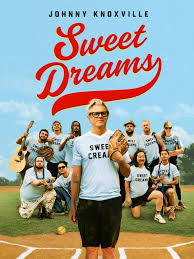
SWEET DREAMS
US, 2024, 95 minutes, Colour.
Johnny Knoxville, Bobby Lee, Jay Mohr, Beth Grant, Brian Van Holt.
Directed by Lije Sarki.
There seem to be too intentions in the making of this film. One is a film about rehab. The other is a softball competition film. But, probably the is that this is very much a rehab film using the softball competition as a focus for the energies and striving for rehabilitation.
Sweet Dreams is the name of an institution, for men only, the men managing for themselves, cooking and cleaning, attending meetings, acknowledging their drug and alcohol addictions, their sense of inferiority, their hopes for some kind of change in their lives.
In many ways, this is presented conventionally, the introduction to a range of men, multiracial, but very American in their presence, talk, style, ambitions. The centre is run as a charity, is experiencing financial difficulties. The focus is on softball, training, play, competitiveness, taunts from the rival team… But, of course, some ultimate success.
The surprise of the film, in fact, is the presence of Johnny Knoxville, famous for his jackass movies. This performance is quite different – quite moving at times, especially in the scenes of his explaining himself, his drinking, driving, danger to his young daughter’s life. He is divorced, not allowed to see his daughter.
A lot of the sequences are played for laughs even though there is some tough realism the men and their sense of self-worth, their interactions, issues of hygiene, nicknames and poking fun…
This is very much a film for male audience. There are very few women in the cast at all, the central characters mother and daughter, especially at the end, present with the sense of achievement at the victory that softball. It is a film that men with problems could see which might motivate them to seek some kind of rehabilitation – or for women close to the men to see to encourage them to seek some kind of help.
- Title, the centre, the hopefulness, the management and intentions, the men, their dreams, addictions, self-worth, rehabilitation?
- The main action at the centre, the interiors, the rooms, gatherings, the kitchen, the meetings? This field
- the focus on Morris, his background, talents, sport, the car, his mother, the danger to his daughter, his ex-wife forbidding him to see her? Coming to the centre? Sharing of the room, the smelly inhabitant, the bottom bunk, the urinating? The kitchen, cooking, washing up? His relationship with the other men, some leadership, it is self-deprecation? The phone calls from his daughter? At the meetings, his frank expression of his failures? If the talent with the softball, the team, coaching, defeat, victories? Reunited with his mother and daughter?
- The manager, a charity, his work, relationship with the men, financial difficulties, the group helping with the finances, the issue of the option of the centre?
- The other men, the range, African-Americans, Asian-Americans, their stories, personalities, sharing, the taunting of Crews? At the softball, the hopes, the taunts of the of the team, the role of Morris, observing, encouraging, and the final victory?
- Morris, at the meetings, listening to the stories, the executive for 20 years and his failure, rehabilitation? Some of the others at the Centre for years? The issue of sponsors, Maurice and his discussions, support?
- Comparative absence of women in the cast, the woman with her addiction, the young women and the softball match?
- A serious minded comedy, encouraging men into rehabilitation, for women to support men going to rehabilitation?
Page One, Inside the New York Times
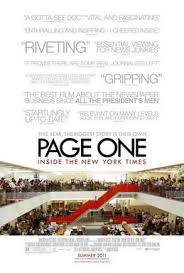
PAGE ONE, INSIDE THE NEW YORK TIMES
US, 2011, 92 minutes, Colour.
Directed by Andrew Rossi.
This documentary was filmed during 2009 and 2010, release 2011. His focus is on the crisis for newspapers, online news information, the reduction of advertising for newspapers, financial issues, sackings, reorganisation… And these themes have continued through the 2000 and tenths into the 2020s.
This is very interesting film to watch in retrospect. There are many interviews by staff of the New Your Times, as well as commentators on media and communications issues, some with hopes for the continuing of the papers, setting up websites and charging for visitors? Others more enthusiastic about alternate online means of communication, instant communication rather than a daily paper.
Of particular interest in retrospect is the issue of the WikiLeaks, Juliana sounds and the decision by the New York Times to publish his material. There is reference to Daniel Ellsberg and the Washington Post and the Pentagon Papers crisis in the 1970s, highlighting it was a different time spent in the location and with 2010
The controversial video released by WikiLeaks about the deaths in Iraq, the vast number of pages released, interviews with Juliana sounds, issue of whether he was a reporter or journalist, political issues, ethical issues, media issues, decision to publish and highlight after redaction to prevent danger to American citizens.
Throughout the film there are interviews with David Carter, former addict and now journalist, strong-minded, pursuit of interviews, very much pro newspapers, moving towards acceptance of the online transitions.
It is interesting, also in retrospect, to note how many male interviewees there are in the film. There are some women and the prospect of the new manager of the Times being a woman, but the world presented in this documentary is very much a male world.
The film is useful for its focus of the issues for newspapers at that time, a useful retrospect – but the issues are still significant, with the comments in this film about the use of twitter and its immediacy and in the 2020s with Elon Musk and the transition to X.
Loving Highsmith
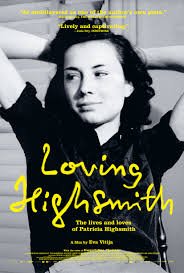
LOVING HIGHSMITH
Switzerland/Germany, 2022, 83 minutes, Colour.
Voices of: Gwendolyn Christie.
Directed by Eva Vitija.
As Patricia Highsmith notes in this documentary, she was listed in the international Who’s Who. For readers and filmgoers, the name Highsmith immediately refers to Patricia Highsmith.
It should be noted that this documentary runs for 83 minutes. Clearly (and as a number of bloggers remind us) there was a lot more to her life and to her career that is not mentioned. However, one might see this documentary as an opening up of the life and of Patricia Highsmith. She was born in 1921, Strangers on a Train was released when she was 30, she died in 1995.
The filmmakers have based the documentary on excerpts from Patricia Highsmith’s diaries. Her writing appears on screen (and very difficult to read even for people with good eyesight). Which means then that this is Patricia Highsmith’s view of herself. And, actress Gwendolyne Christie (Game of Thrones) provides the voice for Highsmith. The voice fitting very well with the voice of the actual writer heard in quite a range of interviews with her.
On the biography aspect, there is her birth in Texas, the distance from her mother (and later reminiscences of an attempted abortion), staying with her grandmother and family in Texas, her mother bringing her to New York at the age of six, her schooling in New York, her wanting her mother’s love, her mother’s blunt comments about her life and relationships, a separation from her mother even though she dedicated two of her books to her.
There are scenes of rodeos in Texas but, probably too many of these throughout the film, the audience understanding the world of Texas. There are interviews with to her grand nieces, highlighting the bond between their grandfather and their grand aunt. They remind audiences of the atmosphere of segregation and racism in the South as well as public propriety.
The film’s main focus points is that of Patricia Highsmith’s sexual orientation, her mother’s comment on it when she was young, her relationships, her attitude towards men, the gay clubs in New York City, in Paris, and interviews with a range of women who knew her and/or were in a relationship with her. They certainly fill in the background of her life, many partners, relationships, her living abroad, homes in London, France, Switzerland.
While there is an emphasis on the books that she wrote, many are not named. Those that are named of those which were filmed – and, looking at the IMDb, one realises that there were many more films based on Patricia Highsmith novels over and above those treated in this film – Deep Waters (French and American versions), Two Faces of January, A Kind of Murder…
The film has a substantial number of clips from the key films highlighting the key novels. Alfred Hitchcock made Strangers on a Train and there are scenes from this and Patricia Highsmith discovering the idea and the development of the novel. Her second novel was the lesbian story, the Price of Salt, published under a pseudonym with comments about the publishing of lesbian novels in those times. However, she did publish it before her death with the title, Carol, the title of the film with Cate Blanchett and Rooney Mara, with a significant number of clips included here.
But, Patricia Highsmith is most notably linked with Tom Ripley, several novels about the charmingly psychopathic killer. There are no clips from the French version in 1962 with Alain Delon. The main clips are with Matt Damon from The Talented Mr Ripley and then some excerpts from Wim Wenders’ The American Friend with Dennis Hopper.
Which means then that, although there are limitations and room for many developments in the portrait of Patricia Highsmith, this documentary serves as an interesting introduction.
He Ain't Heavy
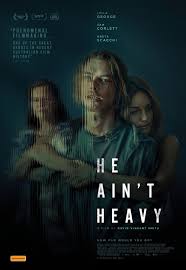
HE AIN'T HEAVY
Australia, 2024, 102 minutes, Colour.
Leila George, Sam Corlett, Greta Scacchi, Clarence Ryan, Alexandra Nell.
Directed by David Vincent Smith.
It is over 50 years since the group, The Hollies, sang “He ain’t heavy… He’s my brother!” (1969).
Which means that this is a film about a brother, a brother in difficulties, bearing a heavy load. In fact, the burden is addiction and consequent mental illness. Which also means that this is a very serious film, quite demanding on its audience, affecting the emotions but also the very serious challenge as to the best means to assist someone with a mental illness. how much reliance on doctors and psychologists? How much reliance on committing to institutions? How much reliance on medication? And any personal intervention to effect some kind of healing?
This film was made in Western Australia. The central character is a sister, Jade (Leila George). She is in her 30s, has a loving but sometimes strained relationship with her mother, Bev (Greta Scacchi). And the brother is her younger brother, Max (Sam Corlett) but dependence long since, a history of violent outbursts but with no memory of his actions, partly living on the streets. There are flashback memories of brother and sister when they were young, times when there was hope.
Jade elicits audience sympathy because, with her concern about her brother, she has not done anything much with her life, serving behind a bar, sometimes socialising with a friend, but preoccupied with Max. Audiences will be struck by the physical similarities between mother and daughter, so they will not be surprised to find that Leila George is, in fact, Greta Scacchi’s daughter.
The challenge of the film is watching Jade’s decision to put Max in a situation of cold turkey. She persuades him to come and help with clearing up their grandmother’s house, spikes his drink, putting him into a room where she hasset up a surveillance camera, locking the door (three locks) and the window covered by bars. Needless to say, what follows is quite harrowing for Max, for Jade, and also when her mother arrives and discovers what is happening, eager to let her son out, exhorting her daughter to get dressed up and go to a farewell party for her friend – which ends with Jade and violent outburst towards an insensitive partygoer who keeps going on and on about her brother.
Sam Corlett gives a very vivid and persuasive performance of somebody undergoing the throes of cold turkey, the physical consequences, the emotional consequences, the psychological consequences.
The director, David Vincent Smith, originally made a short film on this theme. He explained that the background was his experiences with his own brother.
- The title, the Hollies 1969 song,… He’s my brother?
- Audience response to stories of mental illness, addiction, treatment, impact on families, responsibilities, love?
- The setting in Western Australia, the suburbs, homes, the streets, medical centres? The musical score?
- Based on a true story, the director and the experience of his brother? The intensity, concern, empathy? Frustrations?
- The situation, the opening, Max at the door, ranting and raving, Jade approaching, entering the house, her mother inside, the neighbours complaining, the confrontation, Max taking the car and crashing it, disappearing?
- The title, Jade and her brother? Growing up, their experiences, the presence of their mother, caring for Max, taking jade for granted? The impact on the adult Max?
- Jade, age, serving in the bar, never having travelled, her friendship with Tegan, her prospects, sense of frustration? The relationship with her mother, loving, tensions? Her concern for Max, growing up, memories of the past, the strong bond with the brother?
- Max, his reputation, on the street, the drugs, the flat with his friends, watching television? Jade bringing him to the grandmother’s house to help with the moving? Her setting up the house, the surveillance? His drinking? Getting the room, locking him in, the bars, the three locks, her ability to look in through the bars, bring him food? The stress on her, tentative, the right thing or not?
- Max, the reaction, the drugs, the food, his cold, ranting and raving, swearing, the hole through the wall, covering it up, pretending to be unconscious, the attack on Jade? Her violence towards him? The days passing, the effect, his moods? Some happy memories?
- Jade and her mother, grandmother’s house, the going over to clear it up, Jade’s plan? Her mother coming over, her reaction to Max, locked up, her wanting him freed, her concern, the food, conversations, gradually accepting it? Urging Jade to go to Tegan’s party? Unlocking the door?
- Jade, unwilling to go to the party, her mother giving her the dress, at the party, the friendship with Tegan, talking with her, confidentiality, the young man talking about Max and his reputation, not taking any hints, punch Jade ing him? Her going home, the confrontation with her mother?
- The flashbacks, Max and his behaviour, taking him to the medical centre, having to wait hours because of the delay for mental care? The cumulative effect? And the scenes of bonding between brother and sister, the guitar, the music?
- The police, the contact, Max and the bashing, his remembering nothing, the photos of the victim? Jade, in the car, looking at the victim’s family?
- Resolution and no resolution? The temporary calming of Max, the police arriving, jade allowing him to be handcuffed, taking him away? His future? Jade and her mother? Jade and the possibilities of opening up her life?
Sonic the Hedgehog 3
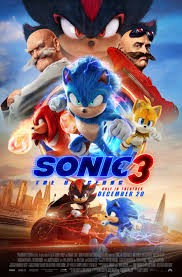
SONIC THE HEDGEHOG 3
Jim Carrey, voices of: Ben Schwartz, Colleen O’Shaughnassy, Idris Elba, Keanu Reeves. James Marsden, Tikka Sumpter, Kristyn Ritter, Natasha Rothwell, Tom Butler.
Directed by Jeff Fowler.
Audiences, younger audiences, will get their money’s worth, and their expectations worth, as they enjoy this third adventure on the computer games hero, Sonic, the Hedgehog.
Sonic, Voiced by Ben Schwartz, featured in the previous two films, and all films directed by Jeff Fowler. Sonic found two further accomplices in the second film, Knuckles and Tails, voiced by Idris Elba and Colleen O’ Shaughnassy. They are quite engaging characters, Knuckles very solemn and principled, Tails, friendly with the lighter touch. So, what will they get up to this time?
The initial answer to the question: what could be better than Sonic and Jim Carrey returning as Dr Robotnik? – Two Sonics and two Dr Robotniks. And, Jim Carrey, who tends to steal every show, obviously enjoyed himself in the previous two films and even more clearly, enjoys being Dr Robotnik and his newly discovered grandfather - equally moustachioed, grandfather’s white. (And, for adult fans and their memories of Jim Carrey’s films, plenty of his antics, over the top, plenty of improvised dialogue, and a reminder that it is 30 years ago that he began to make his mark!)
This time, the three friends, benign aliens, who with their great friends from the other films, Tom and Maddie (James Marsden and Tikka Sumpter). And then authority intervenes, But, frozen for 50 years, another alien hedgehog has now been released, Shadow (voiced by, of all people, Keanu Reeves). And not only is there the grim Shadow, speedily wreaking disaster wherever he rushes, but grandfather Robotnik also appears, daring his grandson, doing a double act in sinister behaviour – except that the original doctor about Nick has made peace with Sonic and his friends.
With the Sega computer games’ background, all kinds of action, no matter how impossible they might seem, ranging from Tokyo to America’s Middle West, they happen. Lots of fast action, always on the move, challenge to the goodies, the dire actions of the baddies, including resurrecting a huge spaceship and grandfather Robotnik’s vengeful ambition to destroy earth and all humans.
But, right from the beginning, there is a fair deal of moralising, about good behaviour, integrity from the heart, Sonic and his competitiveness, his ambitions in leading the team, that it is his team, he has to learn that revenge is no worthy motivation.
So, a family film combination, endearing characters for the youngsters, Jim Carrey for the parents and grandparents accompanying the youngsters, lots of colourful action and dangers, but always script lines enhancing the moral point of view.
Yalda, a Night for Forgiveness
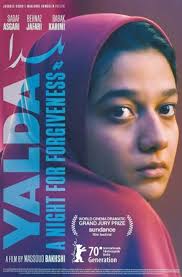
YALDA: A NIGHT FOR FORGIVENESS
Iran, 2019, 89 minutes, Colour.
Sadaf Asgari, Behnaz Jafari, Babak Karimi, Fereshteh Sadre Orafaly.
Directed by Massoud Bakshi.
Iranian films which are exported around the world are frequently very striking, explorations of human values which have surprised many audiences, these films coming from the Islamic Republic with its very strict laws and regulations.
This film is quite surprising. It focuses on forgiveness in Islamic tradition. And, during the 2000s, there was a popular television program where accused people appeared on the television set and are confronted by individuals they have offended because of the crime and who have the power to lead the accused go free. There is a television audience at the studio. There was a wider television audience watching at home – and the collection of money to cover the expenses for the accused.
A young woman, now aged 22, was married young to a man much older than herself, difficulties in the marriage, some violence and her accidentally killing him. While she had a good relationship with the man’s daughter from a previous marriage, this daughter now is demanding justice for the crime. The young woman has been in prison.
The scenes on the set are quite striking, the hard attitude of the daughter, seemingly implacable. And focus on the vulnerability of the young woman and her making her plea and apology. And there is also the razzmatazz of the compere and the atmosphere of the reality show, the behind the scenes with producers, chaperones.
There is an interesting development outside the television set, the daughter upset, going outside, becoming involved in an incident, accidentally, issue of blame and her returning. Then the revelation that the young woman had had a child which was taken away for adoption. And behind the scenes, the very dominating mother of the young woman and the arrival of the adopting couple.
Interesting themes in themselves, especially the reality show and the possibilities for public forgiveness, but very interesting as coming from the Islamic Republic of Iran.
- An audience entry into the culture of Iran, laws and customs, religious society, popular culture, television?
- The title, the custom, the television show, running for 11 years, accused coming onto the show, the discussion with the person possibly forgiving them? The background, laws, murder and executions, reprieves, the forgiveness, the collection for the forgiveness?
- A brief film, a focus on the characters, the characters in themselves and their past, relationships? In public on the television set?
- The focus on Maryam, age 22, the marriage, the older husband, the relationship with Mona? The husband, the relationship, confrontations, the accidental killing? Her arrest, imprisonment, condemnation? The possibility for forgiveness, depending on Mona?
- Maryam and her relationship with her mother, her mother dominant, behind-the-scenes, the birth of the child, the adoption? Her intervening at the station, the demands on her daughter, and the adoptive parents? With the producer, her interventions?
- Mona, the death of her father, the previous relation to marry, her resentment towards Maryam, the behaviour at the television station, listening, thinking, the audience response, the demands, the situation and her not wanting to be there, leaving the studio, outside, the encounters, her return, the voting, the audience response, her stern comments? Her leaving?
- The revelation about the baby, the adoptive parents, Maryam and her wanting the baby, the role of her mother, the producer and the decisions?
- The television company, the host, style, the public audience, the wide viewers, the producer, interventions, other members of the staff, observing, encouraging?
- The experience for Maryam, being prudent, silent, her emotions, her age and inexperience, the influence of her mother, the impact of the child? Her careful answers, imploring Mona? The final decision and its impact on her?
- The revelation about the baby, the adoptive parents, their characters, coming to the studio, demanding to enter, their being allowed in, with Maryam’s mother? The issue of the future of the child?
- Family issues in the Iranian context, Iranian law, and the religious theme of crime, responsibility, atonement, forgiveness?
Grand Tour
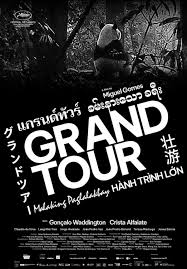
GRAND TOUR
Portugal, 2024, 128 minutes, Black-and-white and colour.
Goncalo Waddington, Crista Alfaiate.
Directed by Miguel Gomes.
An exciting title. However, a reviewer has to search for words to indicate the style and impact of the film. Two words that come to mind are “exotic” and “esoteric”.
And these are adjectives suitable for a description of the career of the writer-director, Miguel Gomes, for the range of films over 20 years. He is a Portuguese director whose “arthouse” feature films have been very popular on the film Festival circuits. Gomez does incorporate narrative but not in any linear, start to finish, manner. He is comfortable in moving, often very quickly, from place to place, country to country, looking forward, flashbacks, his characters as well as his audiences, sometimes lost in time. And he is fond of filming in black and white, impressively striking black-and-white photography.
Which does lead us to the consideration of Grand Tour. One of the exotic aspects is that his central characters are both English, one a civil servant working in Singapore, the other his fiancee who comes to Asia in search of him. And, they speak in Portuguese, the British style of the characters and their Portuguese dialogue creating some of something of an anomalous experience for the audience. And, once again there is the striking black-and-white photography but frequently moving into colour, often unexpectedly, scenic, fairground scenes with puppets…
And the film is also exotic in so far as this tour, which, ultimately, is not so grand, moves from Singapore to Thailand to Vietnam to Japan to China and its far reaches. (While the film was made during the Covid era, and much of the film produced in studios, Gomes directed by communication to the different countries for scenic footage.
And for the esoteric. The action opens in Singapore in 1918 and Edward, the British civil servant, is immersed in the period, in means of communication, in transport, his moving from country to country, the film footage is not confined to 1918. Often, there are contemporary images of Asian cities – and for visitors to Vietnam, a reminder of the heavy cycle traffic in the streets. So, playing with time, the action of the past, yet the timelessness of the story and the characters.
As Edward goes on his grand Tour of the Asian countries, and journeys into the interiors of China, his story stops. The audience is introduced to Molly, the fiance, arriving, determined to find Edward, eager for marriage, more attention given to her character than to Edwards, venturing on her travels, pursuing Edward (and again time doesn’t matter, she is suddenly here, suddenly there, close to Edward, searching for him in a train wreck, always missing him) but enjoying quite a different Grand Tour for herself, the range of people she meets, her emotional struggle, and her future.
Definitely a cinema experience for an audience which appreciates something different, excited by the director’s different vision, approach to filmmaking, unexpected storytelling and moving between time eras, moments of realism, surreal moments, moments of fantasy, mostly in black and white, sometimes an unexpected cover.
Miguel Gomes won the award for Best Director at Cannes 2024.
Children's Train, The/ Il treno dei bambini
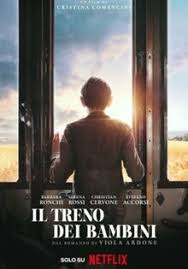
THE CHILDREN’S TRAIN/ IL TRENO DEI BAMBINI
Italy, 2024, 104 minutes, Colour.
Barbara Ronchi, Serena Rossi, Stefano Accorsi, Christian Cervone, Ivan Zerbinati.
Directed by Cristina Comencini.
An Italian film, well worth seeing.
Even eight decades after the end of World War II, war stories continue to be made and appreciated. This film might be called an immediate-post-war film. The setting is Italy and the train travels from Naples in the South to Modena in the North.
But there is an arresting prologue to the film, the 1990s, a celebrated violinist, played by veteran Italian actor Stefano Accorsi, arriving to give a violin recital, a man with some prestige and talent. As he is about to go on stage, he receives a phone call telling him of the death of his mother. And the screenplay goes back to the immediate end of the war, the departure of the Germans, the arrival of the liberating forces and life in Naples in the aftermath of war destruction.
The first part of the film focuses on a young boy, Amerigo, Christian Cervone always convincing, living with his impoverished and illiterate mother, Serena Rossi, the story that her husband had gone to the United States for opportunities. We see the poverty, buildings and ruins, the children running free or involved in apprenticeships. In the background one of those smart men, fashionably dressed, who have benefited by the black market.
It is in this context that members of the Communist Party had devised a program for the children of the poor families. They are to go by train to Modena and be cared for by sympathetic families in the North, given some opportunity for family life, work, for learning skills, making friends. However, there is some popular antipathy towards the Communist Party, some fearmongering by older women, telling the mothers of the children that they will be shipped off to Siberia, that they will be eaten, that they will be put in ovens… Which does instil some fear in the children themselves. However, they board the train, nervously travelling but then welcomed in Modena.
Amerigo is young, nervous, away from home, without a family to take him, allotted to a former partisan, Barbara Ronchi, whose partner was killed during the war. She has no experience of being a mother. Much of the effectiveness of this drama is her response to Amerigo and his response to her, forming a great bond, but his also benefiting, sometimes happily, sometimes being picked on as a Southerner, by the wider welcoming family, especially by the father who introduces Amerigo to the violin.
Then the drama of the return home, the benefit of life in the North, the hardships back again in the south, his mother sending him to be an apprentice, pawning his violin, cutting off his connections with the North.
In the latter part of the film, there is the pathos of the older Amerigo, after his violin recital, coming back to Naples, revisiting the neighbourhood, his house, the memories, affection he found in the North, and the regrets on his return home.
Recommended.
- The title, tone? The children, the train, the destination, hope? Naples, World War II, occupation, liberation? An Italian story?
- The visuals in Naples, homes, the streets, the markets, the war ruins? The contrast with Modena, less war damage, the homes, the farms, the town, celebrations? The musical score?
- Introduction to Amerigo the violinist, celebrity, arriving, his status? His manner, the phone call, the death of his mother, to play or not to play, his decision, the performance? The flashbacks? After the death of his mother, the return to Naples, the house, discovering the violin, his mother buying it back? The memories, the grief, the happiness, learning the violin and playing it?
- Post-war Naples, the effect of the occupation, poverty, hunger, the families, the absent men, migrations to America, Antonietta, with Amerigo, the work, lack of food, eking out an existence? The state of the many children, the lack of a future, the scenes at the market, the furs and the customers, the device of the rats and their fur, painting, the storm and the expose, Antonietta, illiterate, a hard life, for her son? Her relationship with the wheeler dealer, his family, the news later of his arrest?
- The Communist scheme, the trains of happiness, the proposal, the mothers listening, the reaction of the children, Modena as the destination? Opportunities, education, and the return?
- The mothers, the range of mothers, in favour of the scheme, their hopes? The opposition in the town, the women, the demonstration at the station, the ranting, the children being taken to Siberia, the poverty, eaten by the inhabitants, the ovens, the children hearing the stories and their fear? The compassionate official and her assistant, confronting the opponents? Helping the children onto the train? Amerigo, reluctant, his mother chasing the train?
- The train ride, the drama, the children and their fears, sleeping? The plans to escape?
- The arrival in Modena, the distribution of the children, the hosting families? Amerigo alone, Derna and her role as a partisan, the loss of her partner, living alone, taking on Amerigo? His friend from Naples, the young girl and her happiness?
- Alice, Derna not used to having children, weariness, suspicions, the baking scene and Amerigo remembering the threat of children in the others? His room, more comforts? The meeting with the family, the kindly parents, the sympathetic father, the sons, the older sympathetic, the younger one jealous of Amerigo, their dealings, the fight at the fair, but then the growing friendship? Amerigo bullied at school, the Southerner? The happy scenes, meals, work and training? The young girl, Rosanna, afraid, not wanting to be there, the episode of finding the helmeted skeleton along the railway tracks?
- The father, the violin, Amerigo and his curiosity, touching the violin, his natural capacity, the father encouraging him, the practice?
- The time passing, Amerigo and the feeling of affection, Derna and her story, her partisan companion, his death, the effect of having the boy with her?
- The fields, their greening, time to go home?
- The return home, Amerigo and his sadness, the encounter with his mother, her harshness, sending him to work, as an apprentice, harsh? His reaction? Running away, going to the centre, discovering the letters and parcels from Modena and his mother not letting him have them? The pawning of the violin? His running away?
- The happy return, the older Amerigo and his visit, his memories? The role of his mother, writing to Derna, sacrificing her son?
Anora
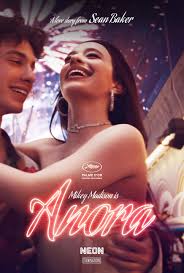
ANORA
US, 2024, 139 minutes, Colour.
Mikey Madison, Mark Eydelshteyn, Vache Toymasyan, Karren Karagulian, Yura Borisov.
Directed by Sean Baker.
Winner of the Palme D’Or at Cannes, 2024, enthusiastic reviews, many award nominations, Anora is a very much talked-about film.
However, there are some films in a reviewer’s experience that do not resonate at all and the challenge of how to write a fair review. This is the case for this reviewer and Anora
This reviewer hasseen writer-director, Sean Baker’s other films, small, independent, down-to-earth, several focusing on sex workers, Tangerine, Starlet, Florida Project. And here, Anora is a lap dancer, sex worker/escort in the Russian area of New York City. The plotline is quite basic and straightforward, Anora encountering a rich young son of a Russian oligarch, escort, attraction, proposal, Las Vegas marriage – displeasure of the young man’s minders and his parents, their challenging the marriage, rough arm tactics for Anora, these tactics prevailing and winning.
The running time is two hours 20 minutes, quite a long time to spend with Anora and Ivan, self-indulgent, irresponsible, let loose in the United States, defying his parents and their thug minders.
Many of the reviews highlight how funny the film is, especially the clashes between Anora and the tough Russians. That will definitely depend on your sense of humour, appreciation of farce and sense of the ridiculous. Reviews also praise the performance of Mikey Madison as Anora, definitely entering into the dramatics, the farce, the fiery confrontations.
Perhaps the best way to describe what happens and its tone is to highlight that there are three acts, so to speak, in the film. The first act is focusing on Anora, who work at the club, her friends, her clients, the encounter with Ivan, his infatuation, Las Vegas and the marriage – all accompanied by sexual exhilaration, hangers-on friends, self-indulgence as a philosophy of life, couldn’t-care-less irresponsibility (and a huge bill for all their destructive mess of their Las Vegas suite).
The second act is the response of the Russian minders in New York City, dismay at learning what Ivan has been up to, confronting him – and his running away – and the fiery encounter, at great, great, length with Anora. Much of this combat seems to be improvised, the director really enjoying the set up and filming, and continuing to film. Anora is one of those types who can give as good as she gets (at times better) and this whole confrontation has the atmosphere of farce.
The third act is the confrontation with the oligarch but, more forcefully, with his dominating wife, rounding up the ineffectual and cowardly Ivan, dealing with Anora and her defiance, everybody against her except one of the thugs, whom she treats violently, but who has feelings for her. Anora doesn’t win this encounter with the Russians – but, at the end, she is certainly not down and out.
Later looking at other reviews and blogging, there are many opposite opinions about Anora, some highly enthusiastic, others not so favourable, some rather critical, with which this reviewer identifies.
- Popular acclaim? Critical acclaim and awards?
- New York, the world clubs, neighbourhoods, mansions, the glitter and extravagance of Las Vegas, the Wedding Chapel, the world of the Russian oligarchs, the courts?
- The writer-director, his career, independent filmmaking, the focus on sex workers and sexuality? Issue of class? International comparisons, US/Russia?
- The structure of the film, the first focus on sexuality, the next on the extravagance, the next on the conflict, the final on the resolution?
- Anora, her story, age, background, family acceptance, work in the club, exotic dancing, escorts, the management, the other women, friendships and clashes, the clientele?
- The Russians, Ivan, his age, background, oligarchs, visiting the US, extravagant, the encounter with Ani, her response, successful, his asking for her again, for the week, the financial deal? His sexual appetite? Immaturity? Watching the computer games? His friends, the drugs, the flight to Las Vegas, their behaviour, the bill for damages? The proposal, Ani and her response, the touch of Cinderella, the Chapel, the marriage, back to New York?
- The Russians, Toros and his role in keeping an eye on Ivan, not knowing about Las Vegas, the news of the wedding, his presence at the baptism, the religious dimensions, the interaction, his leaving an apology, driving, Garnic and Igor, their role, the confrontation with-and Ani, Ivan, irresponsibility, running away and hiding?
- The long sequence of Ani confronting the two men, her violent reaction, language, biting, the vase, the destruction? Been tied up? Going and his broken nose, Igor and the bite? The phone calls, trying to control Ani? Torres and his arrival, his stance, wanting her untied, underestimating her violent reaction? The interchanges, her determination, gradually warm down? The phone calls, trying to find Ivan?
- The search for Ivan, the club, the ensuing fight, the computer games, eventually finding him?
- The parents, their flying to the US, the dominating mother, the nonchalant father and his observing? The confrontation with Ivan, mother’s boy, his response? Ani and her continued interventions, despised by the mother? Ani standing her ground, the issue of the divorce, Torres and the financial settlement, Ani and her final estimation of Ivan? A totally weak character?
- The lawyers, the American court, the hearing, Ani and her continued interventions, Toros and she shouldn’t speak, Ivan and his hangover? The realisation that the annulment would have to take place in Las Vegas? The flight, the hearing, Ani and her reaction? The papers? The mother, and in the confrontation and Ivan’s father laughing?
- Igor, his attention towards Ani, the bite, the fight, her sitting on him, gagging her, tying her up? It sympathy? At the court, giving her the ring, her reaction, the encounter in the car? A future?
Real Pain, A
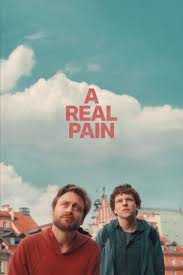
A REAL PAIN
US/Poland, 2024, 90 minutes, Colour.
Jesse Eisenberg, Kieran Culkin, Will Sharpe, Jennifer Grey, Daniel Oreskes, Liza Sadovy, Kurt Egyiawan.
Directed by Jesse Eisenberg.
90 minutes well spent.
An acknowledgement of actor/writer/director, Jesse Eisenberg. for morethan 20 years he has been on screen, his appearance is usually a variation on his vintage performance, more than a touch the edgy. (And he did play Mark Zuckerberg in The Social Contract, 2012.) So, it is surprising to find that he has written and directed A Real Pain, a role for himself which is familiar, but creating a very different character for Kieran Culkin (winning the Golden Globe for his performance).
We are invited to spend the 90 minutes in their company. Ben (Culkin) is already at the airport, lounging around, watching people. His cousin, David (Eisenberg), with a wife and daughter at home , is hurrying to the airport, compulsively phoning his cousin Ben (and later David refers to OCD). And, why are they at the airport? They are cousins, same age, longtime friends, but mostly different in personalities. And their Jewish grandmother, who had experienced the Holocaust, has died but has left them enough money to travel to her native Poland to visit her old home.
They have booked into a tour, led by sympathetic British scholar (Will Sharpe) along with a middle-aged Jewish couple who have prospered in the US, Marcia (Jennifer Grey) a divorcee and, surprisingly, Eloge, a refugee from the Rwandan genocide, welcomed by a Jewish community in Canada and converting.
Throughout the film great deal of Chopin’s music.
On the one hand, there is quite a lot of comedy, sometimes black comedy, always focused on Ben, enormous mood swings, trying to be friendly but ready to turn on people, speak frankly, practically no filters. And, of course, David is always trying to make excuses for him until, finally, in a long close-up on Jesse Eisenberg’s face, as he explains his cousin to the other members of the group.
And, there are some tense moments for the group as well as for the audience, Ben suddenly erupting as they travel first class through Poland and he vigorously reminds them of the train voyages of their ancestors to the camps. And, at an old grave, he turns on the guide, criticising him for his facts and statistics instead of talking in humane terms about the stories. But, at a monument in Warsaw, he rushes off to pose like an attacking soldier, David to take photos, and urging the rest of the group to come and pose with him – which they do.
And, so, on the other hand, there is the very serious issues of memories of the Holocaust, truly moving scene as they visit the city of Lublin and its memories, a visit to the nearby concentration camp of Majdanek, brief indications, silence, for them to remember as well as for us to contemplate. And, finally, quite a visit to their grandmother’s house, an edgy encounter with the neighbours. But, mission accomplished.
The other serious theme of the film is that of the personality of Ben, the fact that he can be a real pain but also the personal, mental struggles.
A significant film for later generations of Jewish people remembering their ancestors in the Holocaust. A significant invitation to empathy for wider audiences.
- The ambiguity of the title? Ben as an annoying real pain? The contrast with the pilgrimage to Poland, memories of the Holocaust in the camps, memories of the real pain, reliving the pain? And pain in the present, Ben as a tormented character?
- Jesse Eisenberg, writing, directing, performing, a variation on his vintage nervy performances, yet his sensitivity to Ben’s character, to the visit to Poland, to the Holocaust memories? His delineation of characters, the situations, torments, serious, humorous?
- The wide range of Chopin’s music as accompaniment?
- The New York opening and closing? David and his world, his mentioning OCD, late, incessant phone calls, reaction at the airport, to Ben, to boarding, the flight? His preoccupation, phone calls, his wife, the young son and his ability to give statistics about buildings? The role of the grandmother, David and Ben’s relationship with her, her leaving the money for them to visit Poland, to see her house? David and his organisation?
- The introduction to Ben, Kieran Culkin’s performance, many hours at the airport, interested in the range of people, his background, the grandmother and his devotion, living in his parent’s basement, the later revelation of the attempted suicide, his mental condition? Erratic, the range of moods, mood swings? The bond with David despite their different worlds, approaches to life?
- The bond between the two, conversations, humour, David’s exasperation, Ben’s outbursts, David’s apologies, sharing the room, the meals, the episode of David sleeping in the train and their having to return, Ben’s confrontational actions, the effect of the trip, the grandmother, memories of the past?
- The tour, the hotel accommodation, the group travelling together, James, British background, not Jewish, five years of leading the groups, his commentary, friendliness? Accosted by Ben about Germany facts and figures, wanting empathy, James saying this was a first-time he had been given feedback, his serious considerations? His sensitivity during the visit to the concentration camp? His consideration of the other members of the group?
- The members of the group, Marcia, age, the divorce, the absent children, ladies who lunch? Friendly, her response to Ben? The middle-aged couple, ordinary Americans, their Jewish heritage, memories, prosperity in America? Eloge and his story, victim of the Rwandan genocide, Canada escape, welcomed by the Jewish community, conversion, valuing the Sabbath and the time for recollection, a gentleman, sincerity? The interactions as a group, attention to James, the various reactions to Ben?
- The various episodes and their impact, comic touches, serious reflections, memories of the past? The monument in Warsaw, larger than life, the resistance, Ben and his posing, persuading all the others to come and pose, David having to take all the photos? The effect on each member of the group from this activity? The issue of travelling in first-class, Ben and his outburst, the memories of the past, the different reactions from the group, not worrying, justified, David and his upset, Ben walking out, David going to find him? The consequence, David going to sleep, passing the station, Ben’s declaration that David was so peaceful and could not wake him up? Getting out of the train, going the opposite direction, eluding the land and the tickets, reuniting with the group?
- The city of Lublin and, the views, the memories, the literary tradition? The gate monument, going to the oldest grave in Poland, James and his commentary, Ben’s outbursts, against statistics, wanting the human element, James taken aback, the reaction of the group, David and embarrassment? The solution of putting the stones and tribute on the headstone? And James’s later comments and reactions?
- The meal, the talk, Ben and his outburst, leaving, David and his monologue, the close-up on his face, his sharing the story of Ben’s attempted suicide, his own emotions, the contrast with their ways of life, yet their bonding and the experience of the trip?
- Preparation for the travel to the concentration camp, the vast Polish countryside, yet the camps are near to the centre of the Lublin? The treatment of the episode, the silencing of the music, the brief commentary an indication of the buildings, the entry, standing, the blue stains on the gas chamber walls, the opens, the vast collection of shoes… And the audience sharing in the silence and the experience of the group?
- The parting from the group, the audience feeling that it has been part of the group on the tour? David and Ben going off on their own, coming to the town, finding their grandmother’s house, putting the stones on the doorstep, the old man on the balcony, not speaking English, the young man, their explaining what they were doing, his sympathy, suggesting the stones were dangerous for the elderly woman living there to fall, David and Ben removing them, the glimpse of the final gesture of the old man, a wave or a sign of dismissal?
- Mission accomplished, going to the airport, the flight back, Ben always able to sleep, David and his phone calls?
- The farewell at the airport, more conversation, the embrace and all that it meant after the trip and the experiences, the Heritage of the grandmother, the Jewish heritage, and David going home and reuniting with his family, and Ben’s saying at the airport, the range of different people there, the enigmatic final close-up of his face?